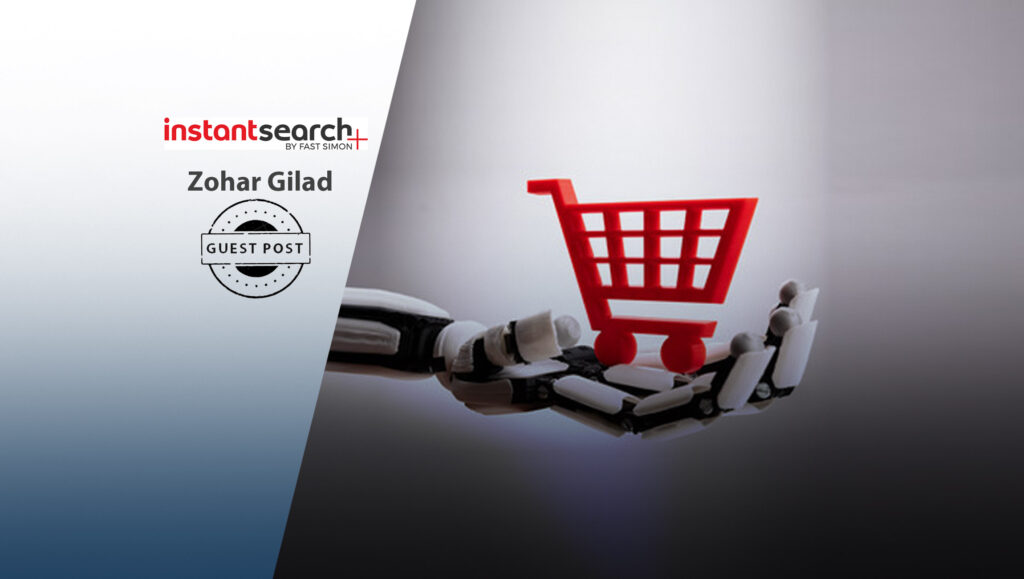Over the last decade, artificial intelligence (AI) has made a meaningful difference in both our personal and professional lives. In 2017, PwC reported that 72% of executives believed AI would represent the business advantage of the future. According to McKinsey, the retail industry has the potential to create $1.7 trillion of value, or 12.39% of total sales, due to AI. The bottom line: for any forward-looking company, it isn’t a question of if you’ll be implementing artificial intelligence, but when.
The retail sector is already reaping tremendous value from AI – especially in eCommerce, where data collection and shopper interaction are measurable and manageable. But what about non-screen retail? What about deeper usage?
The next decade will see AI surpass today’s uses in ways that are difficult to imagine, but much like the portrayal of “futuristic” moving sidewalks on The Jetsons 50 years ago, the effects of AI will become less novel and incorporate seamlessly into our daily, increasingly automated lives. AI and other technology will impact retail and change the landscape as we know it; with the following drivers and results to consider.
Read More: SalesTechStar Interview with Michael Ouliel, CEO at BlackSwan Technologies
Moments That Matter
Technology will innovate further to increasingly predict customer desires based on various signals, driving deeper insight into moments that matter and resulting in higher conversions. Accurate signals about optimal times to push shoppers to buy enables merchants to plug the appropriate ad at the optimal moment, for higher average order value (AOV) and fewer returns.
Better Relationships and Products
Any SaaS vendor is leveraging customer usage data and patterns to deepen relationships, boost adoption, and inform the product roadmap. But what about consumer goods? Apparel? Furniture?
Today, most signals end with the purchase of a product, but the internet of things (IoT) will soon enable products to communicate with the manufacturer or seller to offer more value for the consumer. By transferring data, such as when, where and how the item is being used, merchants will have the opportunity to impact customer experience and loyalty. Consider this: a consumer buys connected running shoes, which transmit information about how they are being used, from how often, to details about impact, etc., delivering the data needed to predict when new shoes are needed, or what else the customer may want based on use patterns (like many cars already do). AI and IoT will become a significant tool for ensuring that the products people want or need are offered at the right time, driving loyalty, experience, and even AOV for merchants.
Personalized Virtual Shelves
Combining AI with AR (augmented reality) will enable shoppers to experience virtual shelves, customized specifically for them, including personalized offers and items, delivered with strategic timing. This will allow shoppers to browse what they’re most likely to purchase, making the retail experience considerably easier, faster, and ultimately, more successful. This notion of personalized offerings for a segment of customers is already implemented in some eCommerce systems as “Customer Groups”, which may vary both on products and price. Taken to an extreme level, a customer group can result in groups of just one person, really proving out the power of technology.
Price Point
According to a recent survey of U.S. online users, 70% of respondents stated that competitive pricing was the most important factor that influenced them to shop with a particular online retailer, with free shipping as the second most important factor (62%). The notion of “Assembled” vs. “Ready to Assemble” products greatly influences price points. Today, assembled items are more expensive than ready to assemble items due to the extra time needed to construct them at the manufacturer, and shipping costs. AR-enhanced instructions simplify the assembly process for manufacturers by simulating assembly operations and the corresponding interactions, and by eliminating the need for assembly manuals, a tedious and time-consuming task for which there is no automated solution. AR support for assembly tasks will prove a factor for competing in the increasingly fierce world of retail (and manufacturing).
Read More: SalesTechStar Interview with Kip Turco, CEO at StackPath
Instant 3D Printing
AI will move warehouses and complex logistics to instant delivery with 3D printing. In the not-so-distant-future, AI will feature the ability to personalize designs and deliver them to the customer’s closest 3D printing facility, where the product will be printed in as little as a few hours (or less). This virtually eliminates shipping time and impacts the production cost for items, significant factors that influence consumer behavior.
More on 3D
Imagine a world in which people do not have to replace large furniture (like a sofa) when it runs its course, by applying technology that can control and synthesize product touch, feel, look, and even smell, right in your living room. In a virtual extended reality world, a sofa would look and feel like real leather, only this look and feel will be generated by a 3D multi-sensor transmitter, outfitting a generic base-model sofa with sensors to fuel look and feel, like leather, velvet, or wool, etc. Combined with a subscription model, consumers will be able to replace the aesthetics of the sofa at a flip of a switch, with an added bonus that significantly reduces the abuse of planet resources. Some basic building blocks for the above already exist today, including military optical cloaking that makes a tank look like a jeep, programmable shock absorbers that make a car drive in different modes, and more.
Though these incredible advancements in technology feel a long way off, AI is quickly forging ahead in the world of retail. In a matter of years, shoppers will not only be enjoying a more personalized shopping experience, the notion of “ship times” will be canceled and replaced with the distance to the closest 3D printing location to pick up items. The promise of AI is staggering, and the retail industry will reap benefits that will transform it forever.
Read More: The New Inputs Leaders Need for a Successful 2021 Plan
Sales and Marketing Tips by The Experts Are Waiting for you on The SalesStar Podcast, Hear More:
*This article was authored by Zohar Gilad, Co-founder & CEO at Fast Simon’s InstantSearch+





















